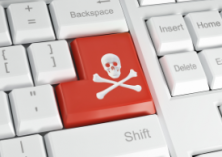Despite US Criticism, Ukraine Cybercrime Chief Receives Few Piracy Complaints

At various points over the years, The Pirate Bay, KickassTorrents, ExtraTorrent, Demonoid and raft of streaming portals could be found housed in the country’s data centers, reportedly taking advantage of laws more favorable than those in the US and EU.
As a result, Ukraine has been regularly criticized for not doing enough to combat piracy but when placed under pressure, it does take action. In 2010, for example, the local government expressed concerns about the hosting of KickassTorrents in the country and in August the same year, the site was kicked out by its host.
“Kickasstorrents.com main web server was shut down by the hosting provider after it was contacted by local authorities. One way or another I’m afraid we must say goodbye to Ukraine and move the servers to other countries,” the site’s founder told TF at the time.
In the years since, Ukraine has launched sporadic action against pirate sites and has taken steps to tighten up copyright law. The Law on State Support of Cinematography came into force during April 2017 and gave copyright owners new tools to combat infringement by forcing (in theory, at least) site operators and web hosts to respond to takedown requests.
But according to the United States and Europe, not enough is being done. After the EU Commission warned that Ukraine risked damaging relations with the EU, last September US companies followed up with another scathing attack.
In a recommendation to the U.S. Government, the IIPA, which counts the MPAA, RIAA, and ESA among its members, asked U.S. authorities to suspend or withdraw Ukraine’s trade benefits until the online piracy situation improves.
“Legislation is needed to institute proper notice and takedown provisions, including a requirement that service providers terminate access to individuals (or entities) that have repeatedly engaged in infringement, and the retention of information for law enforcement, as well as to provide clear third party liability regarding ISPs,” the IIPA wrote.
But amid all the criticism, Ukraine cyber police chief Sergey Demedyuk says that while his department is committed to tackling piracy, it can only do so when complaints are filed with him.
“Yes, we are engaged in piracy very closely. The problem is that piracy is a crime of private accusation. So here we deal with them only in cases where we are contacted,” Demedyuk said in an Interfax interview published yesterday.
Surprisingly, given the number of dissenting voices, it appears that complaints about these matters aren’t exactly prevalent. So are there many at all?
“Unfortunately, no. In the media, many companies claim that their rights are being violated by pirates. But if you count the applications that come to us, they are one,” Demedyuk reveals.
“In general, we are handling Ukrainian media companies, who produce their own product and are worried about its fate. Also on foreign films, the ‘Anti-Piracy Agency’ refers to us, but not as intensively as before.”
Why complaints are going down, Demedyuk does not know, but when his unit is asked to take action it does so, he claims. Indeed, Demedyuk cites two particularly significant historical operations against a pair of large ‘pirate’ sites.
In 2012, Ukraine shut down EX.ua, a massive cyberlocker site following a six-month investigation initiated by international tech companies including Microsoft, Graphisoft and Adobe. Around 200 servers were seized, together hosting around 6,000 terabytes of data.
Then in November 2016, following a complaint from the MPAA, police raided FS.to, one of Ukraine’s most popular pirate sites. Initial reports indicated that 60 servers were seized and 19 people were arrested.
“To see the effect of combating piracy, this should not be done at the level of cyberpolicy, but at the state level,” Demedyuk advises.
“This requires constant close interaction between law enforcement agencies and rights holders. Only by using all these tools will we be able to effectively counteract copyright infringements.”
Meanwhile, the Office of the United States Trade Representative has maintained Ukraine’s position on the Priority Watchlist of its latest Special 301 Report and there a no signs it will be leaving anytime soon.
Source: TF, for the latest info on copyright, file-sharing, torrent sites and more. We also have VPN reviews, discounts, offers and coupons.



Leave a Reply
Want to join the discussion?Feel free to contribute!